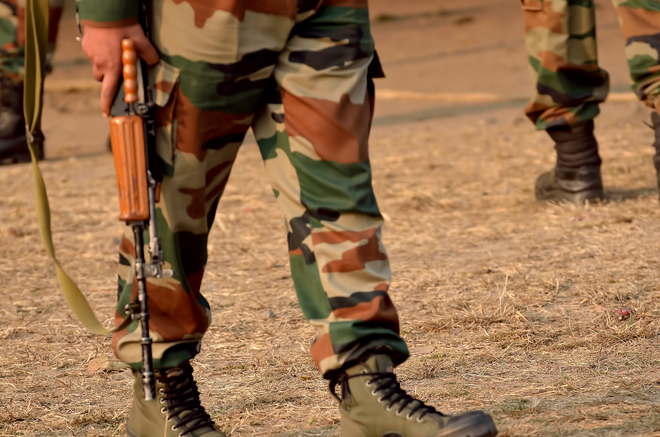
Priyanka Singh
A gallantry award makes a chest swell with pride. It can’t, after all, be bought off the shelf. It may require shedding blood. Pinned on an Army officer, it speaks of valour. Not always, though. Not when it is earned by killing in cold blood; when the victims are innocent civilians; when the bullet-riddled body is not of the enemy. The perpetrator is no hardened criminal or militant trained to kill. He is the man meant to protect the country and its people.
To be fair, not all volunteer to be the fall guy of the unit. Some do say no, at great personal loss — no promotions, no ‘glory’; simply the end of the road for them. Also, not all encounters are fake, nor all victims innocent.
Kishalay Bhattacharjee, a senior journalist and documentary maker, has breached the inner circle for confessions, to tell the grisly tale behind citations and Chakras. His investigative story is very well researched and well told; reading like a slick, explosive documentary.
The account of staged encounters in ‘conflict zones’ of the Northeast, particularly Assam and Manipur, is ghastly, as are the ‘unmarked graves’ in the Kashmir valley. Since when has the Army ‘trained’ its men in such ‘warfare’, or even allowed them to get away with it.
The statistics are worrying. A senior Army officer reveals that of all the 1,394 ‘genuine’ cases the Army’s human rights cell probed in the Northeast and J&K between 1993 and 2013, 1,340 were dismissed as false.
The well-greased structure works with the complicity of the civil establishment, like the police, which ensures the victim is unaccounted for — a beggar, an illegal immigrant, someone who won’t be traced back. The mafia has a whole list of those who are not recorded anywhere.
Staging surrenders is profitable too. Last year in Jharkhand, a Military Intelligence officer reportedly got 550 Adivasi boys to pose as surrendered militants. They sold their land for jobs they were promised but never got, and there is money to be made from rehabilitation schemes for such militants.
Anonymous confessions won’t change a thing. The only casualty in this sinister game is the truth. The Supreme Court in 2007 stated that the ‘devilishly planned’ killings are for getting gallantry awards. ‘You may not be able to prove it in a court of law,’ the officer confesses, ‘but ask any Army person worth his salt, and he will tell you, yes, the Army is big time in the black-money league.’
Where does the money come from? Chit funds, extortion, timber smuggling, narcotics, gunrunning and liquor. Then there is the Sadbhavana project. ‘You get money, you kill; and because you kill, you get money to buy peace.’ Another confession. ‘Follow the system... and it will save you when you screw up... But don’t screw with the system or else you are isolated.’
The killings work on a point system that must be achieved to reach the desired ‘target’ for a unit citation. If short by a few points, killings have to be quickly managed. In Manipur, a GOC was behind by two kills. Overnight, three persons were killed.
Sometimes, terror organisations are simply made up; an IED, in one instance, was made by the Army’s engineering wing, planted at Guwahati railway station, diffused, and in hand was a commendation.
There are other reasons to have that Chakra: It means unlimited train travel with a companion, limitless phone usage, preferential allotment of land and tax exemption every month on an allowance. Greed is infinite. And so, people like Rehman bhai — a ‘fresh’ illegal immigrant from Bangladesh who hopes for a better life for his children — will continue to be sacrificed.
The phenomenon is not new. These ‘tricks’ have been employed for long in the political and police domain, be it in the West Bengal of the 1970s, the Emergency, or the Punjab ‘purge’ under KPS Gill, who had remarked, ‘If there are no legal remedies, there’ll be extra-legal ones.’
It was a matter of time it would plague the Army too. Militancy must be kept alive, because without it, the edifice of corruption and promotion will collapse. All benefit from this tradeoff.
This madness won’t cease. There is much at stake: that medal is within easy grasp; just some killings away. And why not, it can’t be bought. You have to earn it, spill some blood. Even better, if it’s not your own.



























